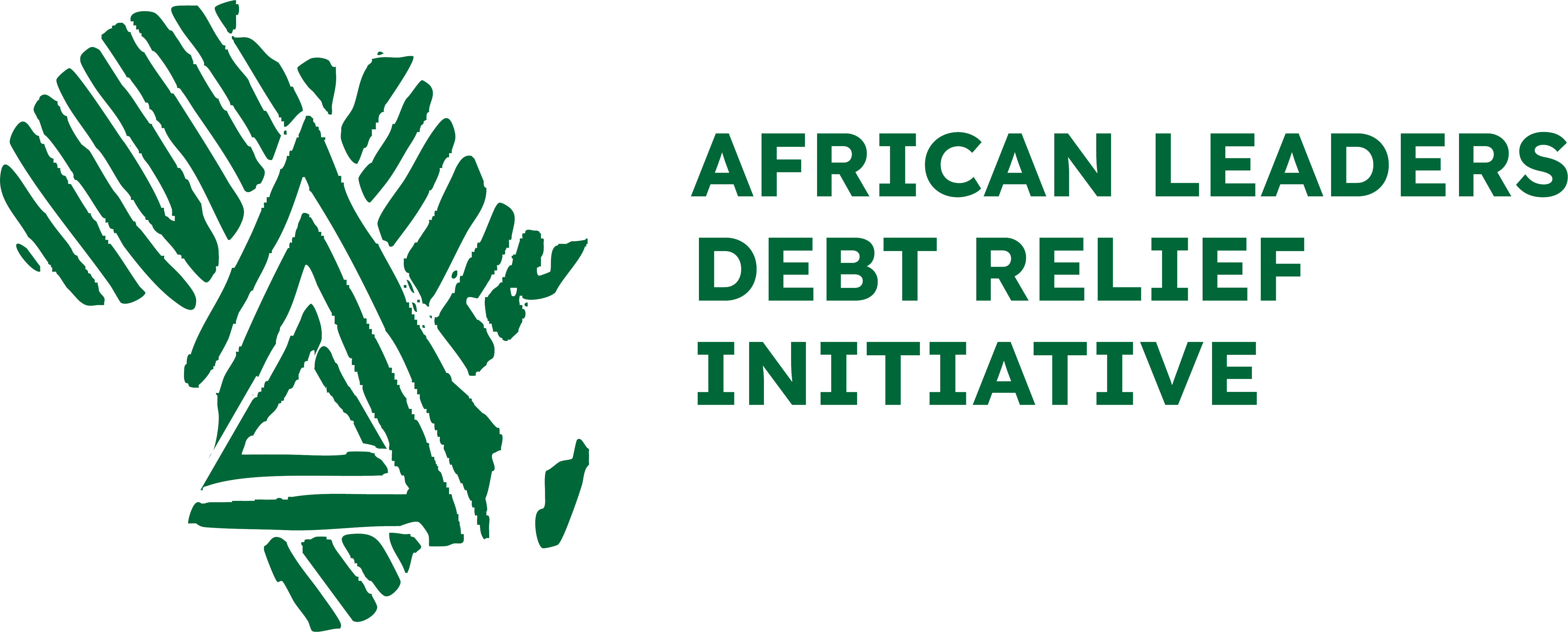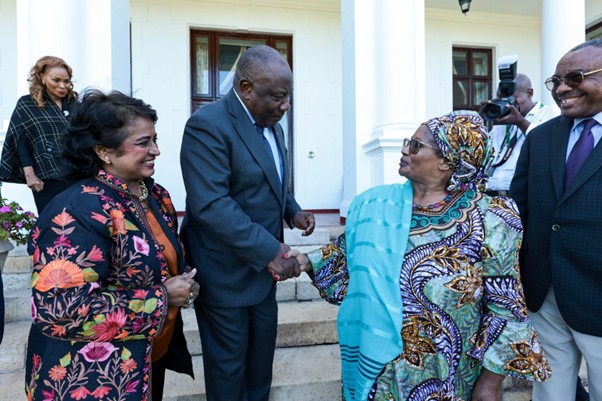Abuja, 21 May 2025
As leaders from over 80 countries gather in Brussels for the EU-AU Ministerial Meeting, eight former African leaders are calling for urgent and transformative action to address the growing sovereign debt crisis across the African continent. This critical moment marks a potential turning point in Africa-Europe cooperation, as the world grapples with rising economic uncertainty, slashed growth forecasts, and increasing debt burdens, particularly in developing economies.
Currently, more than 25 African countries are either in or at high risk of debt distress. With debt service costs projected to consume nearly 30% of African government revenues by 2025, the crisis is severely constraining investment in essential public services, sustainable development, and private sector growth.
The African Leaders Debt Relief Initiative (ALDRI), launched in February 2025, is spearheaded by former African leaders and aims to mobilize international support for meaningful debt relief measures. Through the Cape Town Declaration (28 February 2025), ALDRI reiterates the need for:
- Comprehensive and timely debt restructuring for highly indebted countries,
- and lowering the cost of capital for all low and middle-income nations.
ALDRI also endorses the African Union Lomé Declaration on Debt that was adopted at the AU Conference on Debt held in Lomé, Togo (12–14 May). It calls, among others, for:
- A reform of the G20 Common Framework to ensure timely and sufficient debt relief,
- The rechanneling of Special Drawing Rights (SDRs) through Multilateral Development Banks (MDBs),
- And targeted debt forgiveness on a case-by-case basis.
As Africa prepares for the 4th International Conference on Financing for Development (FfD4) in Sevilla and during the G20 under South Africa’s presidency, ALDRI urges European partners to stand in solidarity with Africa in this defining moment and support these vital and far-reaching reforms.
Debt relief is not charity—it is an investment in shared prosperity. Unlocking fiscal space is essential to achieving the goals of Agenda 2063, creating jobs through sustainable trade and investment, and advancing Africa’s green, digital, health, and education transitions.
Together, a prosperous and sustainable Africa and Europe can be more than a vision—it can be our shared reality.
H.E. Ameenah Gurib-Fakim, Former President of Mauritius
“The AU-EU summits are significant this year as the two unions mark 25 years of collaboration. They present opportunities for both continents to take stock of the enduring partnership and how to strengthen collaboration in mutually beneficial ways. Europe can show solidarity and lead others in measures towards debt relief and mutual trade development in forums like the G20.
If African countries are to deliver on the SDGs, they need debt relief so that their resources are used to invest in education, health and safety nets. As we look forward to another 25 years of cooperation, we urge the EU to commit to comprehensive debt restructuring for highly indebted countries and to lowering the cost of capital for Africa.”
H.E. Hailemariam Desalegn, Former Prime Minister of Ethiopia
“The African Union – European Union Ministerial in Brussels and the Heads of States Summit later in the year present a significant opportunity for European countries to heed Africa’s call for debt relief. This will be achieved by committing to comprehensive debt restructuring and lowering the cost of capital, which would enable African nations to invest in critical areas of development such as health and education. Additionally, these summits offer a platform to strengthen the broader partnership between the EU and Africa, fostering greater collaboration on issues such as climate change, trade, security, and sustainable development. A mutually beneficial partnership between the two regions is key to addressing shared challenges and building a more resilient global economy.”
The African Leaders Debt Relief Initiative comprises the following African leaders:
HE Olusegun Obasanjo, Former President, Federal Republic of Nigeria (Chair)
HE Jakaya Mrisho Kikwete, Former President, United Republic of Tanzania
HE Macky Sall, Former President, Republic of Senegal
HE Joyce Banda, Former President, Republic of Malawi
HE Dr. Ameenah Gurib-Fakim, Former President, Republic of Mauritius
HE Hailemariam Desalegn, Former Prime Minister, Republic of Ethiopia
HE Nana Addo Dankwa Akufo-Addo, Former President, Republic of Ghana
HE Yemi Osinbajo, Former Vice President, Federal Republic of Nigeria


We are entering a new era marked by profound geopolitical shifts, shrinking development assistance, rising trade barriers, and escalating global conflicts. Amid these challenges, however, lies a unique opportunity to foster new and innovative global partnerships grounded in mutually beneficial investments and shared values.
Africa should be central to any such effort. Home to some of the world’s fastest-growing economies, the continent possesses vast renewable-energy resources, including wind, solar, geothermal, and hydro, as well as over one-fifth of the world’s critical minerals, essential to the green transition. But a level playing field is vital to realizing Africa’s growth potential. That means addressing a rapidly escalating debt crisis, which threatens to unravel decades of hard-won development gains.
The scale of the crisis is staggering. In 2023 alone, low- and middle-income countries spent $1.4 trillion servicing external debt, with African countries often paying the highest interest rates and penalties. As a result, these countries have little choice but to divert critical resources from priorities like education, health care, and climate resilience to service exorbitant loans.
Today, more than half of African countries allocate more funding to debt servicing than health care. In Malawi, debt servicing exceeds education spending by a factor of two, meaning that a growing share of young people are effectively being sentenced to a future of ignorance, unemployability, and poverty.
While African governments must commit to sound fiscal management and accountability, the continent’s debt dilemma is not merely the result of budget mismanagement or unwise borrowing. It is also rooted in structural inequities within the global financial system: African sovereign borrowers face extremely high interest rates on international capital markets – even higher than those paid by countries with similar or worse credit histories. This “Africa premium” persists despite the continent’s relatively low default rates.
Moreover, African countries do not have the option of refraining from borrowing, since many are on the front lines of a climate crisis they did not cause. Countries like Kenya, Malawi, and Mozambique have had to take on considerable debt to recover from increasingly frequent and severe natural disasters. Small island developing states like Mauritius are borrowing just to survive rising sea levels. The COVID-19 pandemic, global inflation, and surging food and energy prices have only deepened these vulnerabilities.
Now, the United States has announced steep tariffs on imports from African countries running trade surpluses with it – countries that rely on exports to finance their debt payments. Although implementation has been paused for 90 days, the impact is already being felt across the continent’s fragile economies. Making matters worse, cuts to US foreign-aid programs are set to strain essential services, slow progress toward economic recovery, and exacerbate political and social insecurity, with Africa’s most vulnerable communities suffering the most.
In a deeply interconnected global economy, the consequences of such policy decisions will not remain confined to Africa. By disrupting supply chains, destabilizing economies, and hindering the energy transition, these moves will harm consumers and businesses worldwide, erode investment opportunities, and stifle potential economic growth.
Any solution to Africa’s debt crisis must address the systemic inequities built into the global financial architecture, which leave countries with little choice but to borrow at punitive rates to respond to crises they did not create. That is why I have joined seven other former African heads of state and government to form the African Leaders Debt Relief Initiative, under which we are pushing for a revamp of the global lending system to secure debt relief and improve borrowing conditions for developing economies.
In our newly launched Cape Town Declaration, we call for a large-scale debt-relief initiative grounded in fairness and transparency. This must include comprehensive debt restructuring involving all creditors – private, bilateral, and multilateral – through a predictable and inclusive process. Lower interest rates and longer repayment timelines are essential to creating fiscal space.
We also call for reforms to the global financial system focused on eliminating the “Africa premium” and strategic investments in health, education, peace-building, and climate resilience in order to advance the United Nations’ 2030 Sustainable Development Goals and the African Union’s Agenda 2063. The upcoming G20 Summit, to be held in Johannesburg in November, offers an ideal opportunity to make progress toward these goals. Already, debt sustainability is at the top of its agenda.
Debt relief for Africa is not an act of charity, but a matter of justice. We deserve a fair chance to put our houses in order, invest in our people, and contribute to global economic growth, security, and resilience – not just to repay loans that perpetuate dependency and penury. From Nigeria’s economic reforms to continent-wide responses to past debt-relief programs like the Heavily Indebted Poor Countries (HIPC) initiative, we have shown our willingness and ability to make the most of such opportunities.
Half-measures will not suffice. Only by breaking the cycle of debt – with creditors treating us fairly, multilateral institutions amplifying our voices, and high-income countries fulfilling their climate-finance commitments – can we reach our full potential. This is in the world’s self-interest. After all, a strong, fast-growing Africa can play a crucial role in powering global supply chains, driving innovation, and advancing the green-energy transition.
The Cape Town Declaration is our roadmap. The question is: Will the world walk this path with us?